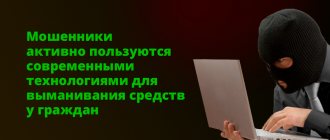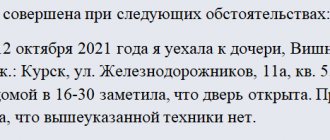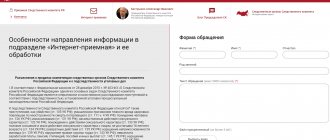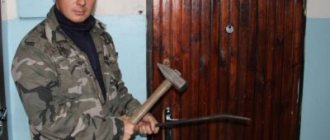Recusal application
A petition to disqualify an investigator is submitted to an official who has administrative functions for the removal of an investigator. These officials can be either the prosecutor or the head of the investigative department or inquiry department.
It is allowed to submit a petition to the investigator or interrogating officer himself so that he can independently submit the petition for consideration by the above-mentioned officials.
In order to clarify all the circumstances referred to by the person filing the challenge, the prosecutor or the head of the investigation may conduct interviews with the applicant.
Commentary on Article 67 of the Code of Criminal Procedure of the Russian Federation
1. This article deals with the recusal of only the investigator or interrogating officer, however, in the general sense of the law, a recusal can also be declared to other employees of the inquiry body, other officials who have been granted the powers of the inquiry bodies in accordance with Art. 40 when carrying out urgent investigative actions (Article 157), as well as officials of the body carrying out the operational investigation, attracted by the investigator to participate in the investigative action in accordance with Part 7 of Art. 164. On the recusal of the head of the Investigative Committee, see Determination of the Constitutional Court of the Russian Federation of December 16, 2008 N 1080-O-P.
2. An application for recusal or self-recusal of an investigator or interrogating officer, which has the form of a separate procedural document, is attached to the materials of the criminal case, and an oral statement is entered into the protocol of an investigative or other procedural action. If the requested challenge is satisfied, the head of the investigation department or the prosecutor removes the investigator or interrogating officer, respectively, from further investigation (clause 10, part 2, article 37; subclauses 5, 6, part 1, article 39).
3. It seems that if the investigator and the interrogating officer, upon discovery of the relevant grounds, do not recuse themselves, and other participants in the process do not make statements about their recusal, then, accordingly, the head of the investigation or the prosecutor has the right to raise and resolve this issue on their own initiative (see also paragraph 3 com to Article 62).
4. Part 2 art. 41 provides another basis for the recusal of the investigator - his carrying out operational investigative activities in this criminal case.
Special situation
March 25, 2021 05:20 p.m.
The lawyer of the Administrative Office of the Krasnodar Territory is appealing the recusal decision issued after the delivery of a summons for questioning
AG learned , the lawyer of the AP of the Krasnodar Territory (AP KK) Vadim Kryakolov on February 19 filed a complaint with the Oktyabrsky District Court of Krasnodar against the decision to challenge him, issued simultaneously with the delivery of a summons for questioning as a witness. The investigator issued both documents on the same day, despite the fact that the lawyer did not sign the interrogation protocol and refused to participate in it. Vadim Kryakolov noted that in ten years of practice he encountered such a situation for the first time and has already filed a complaint under Art. 125 of the Code of Criminal Procedure of the Russian Federation on illegal decisions and actions of the investigator. Denis Kremer, a member of the AP KK Commission for the Protection of Professional Rights of Lawyers, called the situation of Vadim Kryakolov special, since he was taken away immediately after being served with a summons for questioning.
Circumstances of recusal
The senior investigator of the 2nd Department for the Investigation of Particularly Important Cases of the Investigative Directorate of the Investigative Committee of the Russian Federation for the Krasnodar Territory, Philip Shevrikuko, is investigating a criminal case initiated against F. and other persons on grounds of crimes under Part 2 of Art. 171.2 of the Criminal Code of the Russian Federation. Vadim Kryakolov provided F. with legal assistance at the stage of conducting a procedural check in accordance with Art. 144, 145 of the Code of Criminal Procedure of the Russian Federation, including being present during the inspection of the scene of the incident, consulting F., developing a defense position and collecting evidence.
On February 15, Vadim Kryakolov, at the request of F., entered into a criminal case, presenting the investigator with a lawyer’s ID and a warrant. On the same day, the investigator handed the defense lawyer a summons to summon him for questioning as a witness, after which he issued a decision to challenge him. In the decision, he referred to clause 1 of part 1 of Art. 72 of the Code of Criminal Procedure of the Russian Federation, according to which a defense attorney has no right to participate in criminal proceedings if he has previously participated in proceedings in this criminal case as a witness. The investigator also cited Part 1 of Art. 56 of the Code of Criminal Procedure of the Russian Federation that a witness is a person who may be aware of any circumstances relevant to the investigation and resolution of a criminal case, and who is called to testify, except for the cases provided for in part three of this article.
Arriving at the investigator’s office after the second subpoena, Vadim Kryakolov refused to participate in the interrogation and sign the interrogation protocol, explaining to the investigator the norms of the law on attorney-client privilege, as well as the judicial procedure for calling a lawyer for questioning as a witness. After this, the lawyer sent a letter to the Administration of the Krasnodar Territory with a request to clarify the procedure for his further actions. In it, Vadim Kryakolov indicated that the investigator was trying to obtain information that became known in connection with the provision of legal assistance.
The Chamber of Lawyers recalled the recommendations of the FPA
In the conclusion issued at the lawyer’s request (available from the “AG”), the AP KK Commission for the Protection of Professional Rights of Lawyers indicated that, according to paragraph 1 of Part 1 of Art. 72 of the Code of Criminal Procedure of the Russian Federation, a defense attorney has no right to participate in criminal proceedings if he has previously participated in the criminal proceedings as a judge, prosecutor, investigator, head of an inquiry agency, head of an inquiry unit, investigator, assistant judge, secretary of a court session, witness, expert, specialist, translator or witness.
The Commission noted that the participation of a person in a criminal case represents the commission of certain actions provided for by law for the relevant position or procedural status. The participation of a witness in a criminal case is completed after the completion of his first interrogation in this capacity with the drawing up of an appropriate protocol in accordance with the norms of the Code of Criminal Procedure of the Russian Federation. A formal summons for questioning as a witness does not constitute participation in a criminal case, the conclusion emphasizes.
The document states that, by analogy, for other persons listed in clause 1, part 1, art. 72 of the Code of Criminal Procedure of the Russian Federation, a defense attorney cannot be removed from participation in a case if: he was previously assigned as an expert to conduct an examination in the same case, but he did not conduct it; he, as an investigator, was entrusted with the investigation of this criminal case, but he did not take it into his proceedings; he was appointed as a translator in this criminal case, but did not take part in any investigative actions. Thus, the Commission noted, a challenge based on a summons for questioning as a witness before the actual completion of such questioning is illegal.
At the same time, the Commission noted, the resolution was justified by reference to the norm of Part 1 of Art. 56 of the Code of Criminal Procedure of the Russian Federation that a witness is a person who may be aware of any circumstances relevant to the investigation and resolution of a criminal case, and who is called to testify, except for the cases provided for in Part 3 of this article. According to clause 2, part 3, art. 56 of the Code of Criminal Procedure of the Russian Federation is not subject to questioning as a witness by a lawyer, a defender of a suspect or accused about circumstances that became known to him in connection with an application to him for legal assistance or in connection with its provision, except in cases where a lawyer applies for questioning as a witness, defender of the suspect, accused with the consent and in the interests of the suspect, accused.
“As the applicant points out, during the interrogation that took place on February 25, 2021, the investigator tried to obtain from the lawyer information that became known to him from the client, and also insisted that the lawyer, through his testimony, expose his client to the acts accused of her. The Commission has no reason to doubt the veracity of these statements by the lawyer. In this connection, the Commission comes to the conclusion that already at the time of calling lawyer V.I. Kryakolov. During the interrogation, the investigator realized the illegality of his actions. This follows, among other things, from the fact that he cited that very “prohibitive” norm in the resolution on the challenge,” the conclusion notes.
The Commission indicated that in accordance with paragraph 3 of Art. 56 of the Code of Criminal Procedure of the Russian Federation and Art. 8 of the Law on Advocacy, a lawyer (defender) cannot be summoned and questioned as a witness about circumstances that became known to him in connection with an application to him for legal assistance or in connection with its provision.
Regarding the question of when information collected by a lawyer while providing legal assistance is classified as attorney-client privilege and receives procedural guarantees of inviolability, the Constitutional Court, in relation to the possibility of questioning a lawyer as a witness, has previously developed a number of legal positions, the opinion notes. Thus, the legal assistance of a lawyer (defender) is not limited only by the procedural and time frames of his participation in the case during the investigation and trial (decrees of March 27, 1996 No. 8-P and January 28, 1997 No. 2-P; definitions dated July 6, 2000 No. 128-O and dated May 29, 2007 No. 516-O-O).
At the same time, the Commission noted, Determination No. 516-O-O directly states: “The defense attorney does not have the right to participate in criminal proceedings if he has previously participated in it as a witness. This rule cannot prevent the participation in a criminal case of a defense attorney chosen by the accused who has not previously been interrogated during the proceedings, since it excludes the possibility of interrogating the latter as a witness about the circumstances and facts that became known to him in the framework of his professional activities in providing legal assistance, regardless of the time and circumstances of his receipt of such information.”
In the Determination of January 15, 2021 No. 76-O, the Constitutional Court of the Russian Federation indicated that established in paragraphs 2 and 3 of Part 3 of Art. 56 of the Code of Criminal Procedure of the Russian Federation, the prohibition to interrogate a lawyer about circumstances that became known to him in connection with participation in criminal proceedings or in connection with the provision of other legal assistance “applies to the circumstances of any events - regardless of whether they took place after or before the how the lawyer was allowed to participate in the case as a defense lawyer, and also regardless of who decides on the possibility of questioning the lawyer - the court or the investigator.”
It is noted that in Determination No. 863-O of April 11, 2021, the Constitutional Court of the Russian Federation indicated that other investigative actions against lawyers, including interrogation as a witness, and operational search activities are also allowed only on the basis of a court decision by virtue of the instructions of the .3 tbsp. 8 of the Law on Advocacy.
The commission noted that the judicial procedure for calling a lawyer for questioning is generally binding and is not subject to discussion by law enforcement officials. In the absence of a direct description in the Code of Criminal Procedure of the Russian Federation of the procedure for such a summons, by analogy with the law, the procedure enshrined in Art. 165 Code of Criminal Procedure of the Russian Federation.
The Commission for the Protection of Professional Rights of Lawyers suggested that Vadim Kryakolov follow the Recommendations for ensuring attorney-client privilege and guaranteeing the independence of a lawyer when lawyers carry out professional activities, approved by the decision of the Council of the Federal Law Firm of the Russian Federation dated November 30, 2009. In particular, the Commission advised appealing the summons for questioning, interrogation as a witness and a resolution to disqualify the lawyer. It was also recommended that the Council of the Administrative District of the Krasnodar Territory send a lawyer from among the members of the Commission to the court hearings to participate as a defense attorney in the complaints of Vadim Kryakolov.
The complaint has not yet been considered
In a commentary to “AG”, Vadim Kryakolov noted that in ten years of practice he encountered such a situation for the first time and has already filed a complaint under Art. 125 of the Code of Criminal Procedure of the Russian Federation on illegal decisions and actions of the investigator. The arguments in the complaint are similar to those stated in the Commission's conclusion. Vadim Kryakolov indicated that the trustee is currently being defended by another lawyer. He added that, despite the fact that he filed the complaint more than a month ago, it has not yet been considered by the court.
Member of the AP KK Commission for the Protection of Professional Rights of Lawyers Denis Kremer called the situation of Vadim Kryakolov special, since he was taken away immediately after being served with a summons for questioning: “The Code of Criminal Procedure tells us that a person cannot participate in a case if he had previously participated in it as witness. In this case, the lawyer intervened in the case, handed the investigator a warrant, and in exchange received a summons for questioning and a recusal order. In fact, no investigative actions were carried out, and he was immediately taken away.”
“It is true that investigative actions are carried out with lawyers and then disqualification orders are issued, but this case is outside the bounds of the law. Firstly, the recusal order was issued before the investigative action was carried out, and secondly, there was no court permission to carry out the investigative action. This is a very bad trend. Thus, any lawyer can be excluded from the case,” Denis Kremer considered.
He indicated that, according to clause 1 of part 1 of Art. 72 of the Code of Criminal Procedure of the Russian Federation, a defender cannot participate in a case if he previously participated as a witness. In this case, “previously participated” is considered completed when the corresponding procedural action is completed, for example, the protocol of interrogation of a witness is signed. “This is an innovation for a specific investigative department. It was the investigator’s discretion that the interests of the accused contradict each other, but we have not yet encountered such a situation. We are now developing practice on this issue,” noted Denis Kremer.
Marina Nagornaya
SharePrint Direct link to the material:
Share
Recusal during investigative action
Quodcunque aliquis ob tutelam corporis sui fecerit jure id fecisse videtur
- everything that a person does to protect himself is considered to be done legally (lat.)
During pre-trial proceedings, grounds often arise for challenging the investigator, but it is generally accepted that this is a completely futile undertaking, because it is doomed to a deliberate refusal. However, in some cases it is not devoid of common procedural sense when it is implemented directly during the investigative action. The author of this article gives examples of the use of illegal methods by an investigator during a confrontation and tells how to counteract investigative arbitrariness by means of a challenge to an investigator during an investigative action, and in what situations to use the procedural institution of extreme necessity.
Illegal methods in confrontation
In my practice as a lawyer, there was perhaps the most dramatic confrontation that took place in a temporary detention center between an accused bribe-taker and a witness bribe-giver. The whole difficulty of participation lay in the personality of the investigator, who replaced the norms of the criminal process with his own concepts and stubbornly did not want to deviate from them.
When I began to consistently ask numerous questions to the witness and obtain the testimony necessary for the defense, the investigator, without recording them, violating the established procedure, began asking his own clarifying, and most often leading, questions that threatened criminal prosecution. The witness, frightened by this, and already showing sympathy for the investigator, willingly refused the answer given to me, and the investigator recorded precisely this “modernized” testimony of his. At some point, I had to stand behind the seated investigator in order to control his writings, which were displayed on the monitor screen. Then, having received an undesirable answer from the witness, the investigator brazenly and unceremoniously declared that I had heard him incorrectly, and wrote down everything exactly the opposite, or allowed himself to answer for the witness, and then, without a shadow of embarrassment, tried to convince me that this is exactly what the witness testified, and For some reason I listened to this. When my questions seemed dangerous to him, he easily dismissed them, accompanied by the standard phrase “not relevant,” although they were relevant—most directly.
My indignation knew no bounds, but the keyboard and computer mouse were in the unlimited possession and use of the person conducting the confrontation. In response to this, I emotionally expressed objections to his illegal actions, spoke about the inadmissibility of interrogating the defense lawyer, asking leading questions, demanding that he record verbatim testimony given, threatening to write complaints and bring him to disciplinary liability, which, however, didn't bother me at all. The usual confrontation, which initially presented no difficulties, turned into an exhausting battle for every word and lasted about 4 hours. Frightened police officers from the detention center periodically came into the office, finding out if everything was okay with us and whether their intervention was required.
At the end of the confrontation protocol, I had to write multi-page comments and additions, and when leaving, promise to reward the investigator with the pennant of “the worst in the history of the prosecutor’s office and the investigative committee,” predicting his speedy end to his career.
My predictions turned out to be prophetic, since after a short time the investigator was thrown out in disgrace for massive falsification of protocols in other cases, but my petitions to exclude the protocol from the evidence and to conduct a repeated confrontation were left unsatisfied: the investigator and his boss were completely satisfied with the answers witness to the official's questions, and they were not at all interested in the answers to the defense lawyer's questions.
Here is another example that took place in the practice of my colleague. The investigator, bringing charges against a person with the participation of his defense attorney, frankly stated that he was charging him with a crime provided for in addition to Art. 222 of the Criminal Code of the Russian Federation, also part 2 of Art. 105 of the Criminal Code of the Russian Federation, but understands that the accused did not commit murder, but he cannot leave this crime unsolved. In response to these confessions, the indignant prisoner began to express to the investigator the worst words and phrases known to him, earning an additional punishment under Art. 319 of the Criminal Code of the Russian Federation (insulting a government official).
The examples given make us think about what procedural means the defense may have to counteract investigative arbitrariness.
Countermeasures
We know that a witness (victim), when testifying during an interrogation, under the influence of an investigator or other circumstances, can easily sign a knowingly false testimony. There is no need to further explain how important a confrontation in such a case may be for the fate of the accused. Conducted using illegal methods, it may be the basis for reading out the testimony of a witness (victim) who did not appear, and the court will not be able to directly hear his testimony and, as a result, may pass an unjust verdict.
In this regard, when during the course of this investigative action procedural rights are grossly violated, the protocol and testimony in it are distorted, then extraordinary measures are necessary.
Among them, I would confidently include a statement of challenge to the investigator during the investigative action.
Part 2 of Art. 61 of the Code of Criminal Procedure of the Russian Federation provides: “The persons specified in the first part of this article (including the investigator) cannot participate in criminal proceedings also in cases where there are other circumstances giving reason to believe that they personally, directly or indirectly, interested in the outcome of this criminal case"
.
In accordance with Part 1 of Art. 67 of the Code of Criminal Procedure of the Russian Federation: “The decision to challenge an investigator is made by the head of the investigative body...”
.
According to the requirements of Art. 121 of the Code of Criminal Procedure of the Russian Federation: “The petition is subject to consideration and resolution immediately after its application...”
.
Based on these procedural norms, a challenge to an investigator is possible when, during a confrontation, circumstances are discovered that indicate bias and partiality in one or another of his illegal actions and decisions, and even more so an intention, by distorting the testimony of a witness, to convict the accused of committing a crime that he did not commit or create artificial evidence of his guilt.
Having received evidence of the investigator’s interest, the defense attorney, before completing the confrontation, draws up a reasoned challenge to the investigator on a separate sheet of paper, transfers it to the investigator and demands to suspend the investigative action and organize consideration of the challenge, transferring it to the head of the investigative body.
It is not difficult to guess that the average investigator will want to continue conducting the confrontation, and will offer to file a petition for his challenge after its completion. But a defense attorney may take a principled position on the need to consider a challenge, not wanting to participate in an illegal confrontation.
It would not be out of place to note that criminal procedural norms have completely distanced themselves from regulating this situation, and therefore there is no reason to believe that the request made by the lawyer during the investigative action is an abuse of law.
Previously, in the Advokatskaya Gazeta there was already a rather interesting discussion about the right of a lawyer to leave the place of investigative action between respected Moscow lawyers Nikolai Kipnis Shocking or procedural necessity1 and Boris Kozhemyakin A lawyer cannot leave the defense2. Nikolai Kipnis, and then Henry Reznik, defended the legality of the termination of proceedings by the disciplinary bodies of the Moscow Bar Association against a lawyer who, having discovered the groundlessness of the charges brought against his client, immediately challenged the investigator, but it was not considered, after which the defender independently suspended his participation in investigative actions3.
Respected Boris Kozhemyakin condemned the actions of the lawyer, believing that they were more shocking than procedural necessity.
Of course, you should always keep in mind that a lawyer’s departure from an investigative action if the investigator or his superior fails to take measures to resolve the requested challenge may become a reason for disciplinary proceedings in the bar association.
Some qualification commissions advocate an unconditional ban on such behavior for lawyers. However, there is no rule without exception, and the Moscow Bar Association demonstrated this in the above disciplinary case.
It seems to me that the legality of a lawyer’s actions should directly depend on the degree of arbitrariness of the investigator’s actions and on the depth of his violations of the law and procedural rights of the defense.
If during a confrontation the investigator rejected a couple of questions from the lawyer, to which the latter was offended, challenged him and left, then such behavior is unlikely to find understanding in the qualification commission.
If the investigator, throughout the course of the confrontation, systematically rejected relevant questions, not allowing the circumstances important to the case to be clarified, refused to record the witness’s answers, significantly distorted them, answered the questions asked of the witness himself, in fact, in the presence of the defense lawyer, falsified the evidence in the most rude and unceremonious manner guilt of the accused, then the inaction of the lawyer in this case can be regarded as faulty behavior, contrary to the requirements of Art. 8 of the Code of Professional Ethics for Lawyers that a lawyer is obliged to honestly, reasonably, conscientiously, skillfully, principledly and timely fulfill his duties, actively protect the rights, freedoms and interests of clients by all means not prohibited by law, guided by the Constitution of the Russian Federation, the law and this Code.
To properly resolve such situations, it is necessary to use a procedural institution of extreme necessity, when, in order to prevent significant damage to the interests of the client and, possibly, the subsequent issuance of an unfair judicial act, the lawyer, having challenged the investigator and without waiting for his permission, leaves the place of the investigative action, probably forced and harming other protected interests.
At the same time, he does not refuse the defense, does not oppose the investigation, but thus forces him to consider the requested challenge and only then plans to continue his participation in the defense.
For strict adherents of lawyer's piety, I will immediately say that such problematic situations are excluded where the investigator respects the rights of the defense, procedural law and by virtue of Part 1 of Art. 8 of the Code of Criminal Procedure of the Russian Federation provides the possibility of exercising these rights.
In my opinion, the position of those disciplinary bodies that strictly evaluate deviations from the established legal and ethical standards of lawyers, but do not take into account the illegality of the actions of officials who provoked retaliatory actions by defense lawyers, is erroneous.
There is also an important practical aspect to recusing the investigator. After his statement and demand for immediate permission, the investigator will be in danger of disrupting the investigative action. It is possible that this could violate procedural deadlines and create serious problems for him.
Understanding this, a thinking lawyer at some most convenient moment has the opportunity to compromise with the investigator: refuse to challenge in response to the fact that the official will continue to conduct a confrontation in compliance with the requirements of the procedural law, will not challenge permissible questions, etc. .
Ideally, such an outcome is the most acceptable for the defense, and the petition for recusal serves the investigator as a sobering shower for Charcot.
* * *
If you do not take active offensive actions, but limit yourself to writing comments on the protocol of the investigative action, which is what I did, then the likelihood of recognizing the tendentiously printed protocol of the confrontation as admissible increases
and reliable evidence. Unfortunately, the relevant investigative and judicial practice is well known to us...
1 "AG". 2014. No. 21.
2 "AG". 2014. No. 24.
3 Disciplinary proceedings. 2012. No. 9/1406.
From the editors We invite you to discuss this topic on the website advgazeta.ru
Another comment on Article 67 of the Code of Criminal Procedure of the Russian Federation
1. The preliminary investigation, carried out by the investigator and the inquiry officer, is one of the main stages of legal proceedings in most criminal cases, the main purpose of which is to ensure conditions for the effective administration of justice in criminal cases (Resolution of the Constitutional Court of the Russian Federation of March 23, 1999 N 5-P on the case of verification constitutionality of the provisions of Article 133, Part 1 of Article 218 and Article 220 of the Code of Criminal Procedure of the RSFSR // Supreme Court of the Russian Federation, 1999. No. 4). Thus, the results of not only the preliminary investigation, but also the criminal proceedings as a whole, largely depend on the investigators and interrogators carrying out the preliminary investigation, who are authorized to independently carry out criminal procedural actions and make decisions on the case, which determines the requirements of objectivity and impartiality for them. .
2. The previous participation of an investigator or inquiry officer in a previously conducted preliminary investigation or inquiry in the same case is not a basis for his recusal. The fact that he, as an investigator, previously conducted an inquiry into the case does not prevent the investigator from carrying out an investigation into the case.
3. At the same time, the investigator cannot participate in the preliminary investigation of a criminal case if he previously carried out operational search activities in connection with this case (see commentary to Article 41).
4. In itself, a statement to challenge an investigator or interrogating officer (before the prosecutor makes a decision on it) does not entail their removal from participation in the case and the suspension of investigative and other procedural actions.








